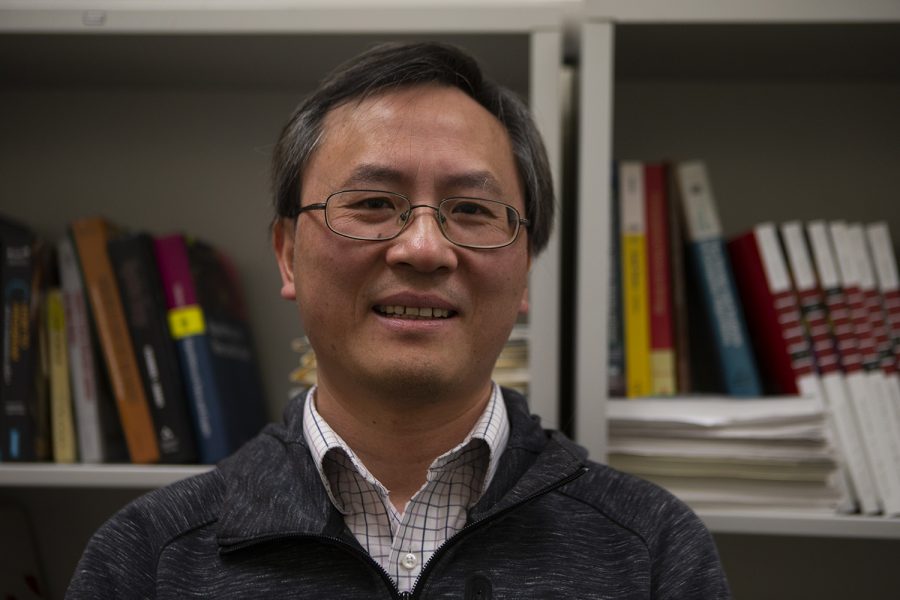UI researchers use artificial intelligence to identify cancer biomarkers
University of Iowa researchers have developed artificial-intelligence technology that can identify cancer biomarkers in non-small-cell lung cancer patients who have undergone radiotherapy and can predict survival outcomes.
Xiaodong Wu poses for a portrait in his office located in the Seamans Center on Friday, Feb. 28, 2020.
March 3, 2020
Physicians and artificial-intelligence technology could team up to treat and diagnose cancer patients in the future, according to a new study by University of Iowa researchers.
Researchers at the College of Engineering and their collaborators in the Carver College of Medicine and College of Public Health recently published an article in a journal called “Scientific Reports” by the Nature Publishing Group.
The study outlines the research team’s hypothesis that artificial-intelligence technology can identify biomarkers in lung-cancer patients who received radiotherapy and can also predict survival outcomes.
Industrial systems and engineering Assistant Professor Stephen Baek, the first author of the article, said the algorithm was successful more than 85 percent of the time on average. While more research is still necessary, the goal is that this technology will eventually be used in a hospital setting.
“The reason why we are super excited about the outcome is because the fact that the neural nets are able to predict treatment outcomes means that eventually, we should be able to have an artificial-intelligence algorithm that predicts different treatment outcomes for each specific patient,” Baek said.
This technology is not designed to replace doctors, Baek said, but to support their decision making with more quantitative information.
It works by using a deep convolutional neural network algorithm, which uses “deep learning,” or machine learning, to predict outcomes using CT scans or positron emission tomography scan images from the cancer patients, according to the research team’s initial report.
RELATED: AI-based cancer treatment platform helps UI
“We have the image of the patient before radiation therapy,” said electrical and computer engineering Professor Xiaodong Wu, a researcher on the project. “And we also have the data showing the patient receiving radiation therapy.”
Currently, the technology has been confirmed on non-small-lung cancer patients who received stereotactic body radiotherapy. Non-small-cell lung cancer accounts for more than 80 percent of lung-cancer diagnoses and is the leading cause of cancer-related death worldwide.
The scan images came from UI Hospitals and Clinics and showed the data for 96 patients receiving stereotactic body radiotherapy. The researchers discovered that some of the geometry of the tumor could be coded numerically and their results were confirmed through validation experiments on 26 more cases provided by the Stanford Cancer Institute.
UI Industrial Engineering Ph.D. candidate Yusen He, who worked on the project, described the deep-learning concept as a pattern within the pixels. Pictures are comprised of pixels, he said, and in each pixel there is an intensity value.
The algorithm can detect patterns from CT or positron emission tomography scans and can outline the biomarkers that will be able to predict the life expectancy of the person, He said.
RELATED: Researchers plan to use artificial intelligence to improve health care
In the future, however, the researchers want to use more clinical data, he added.
“Image can tell us a lot of things,” He said. “But they still cannot tell us how the patient is. The older the patient is, the higher the chance of death … So, at the current stage after the publication of this research, we are trying to incorporate both the clinical features and the image features together to make our AI tool more powerful.”
Other goals for the project include wanting to expand the algorithm so it can identify more types of cancer than merely lung cancer, the researchers said.
“Right now, it is only specific to non-small-cell lung cancer and then stereotactic body radiotherapy,” Baek said. “But we believe we can expand this to other treatment options … We believe we can extend our technology. And that’s our future plan.”















